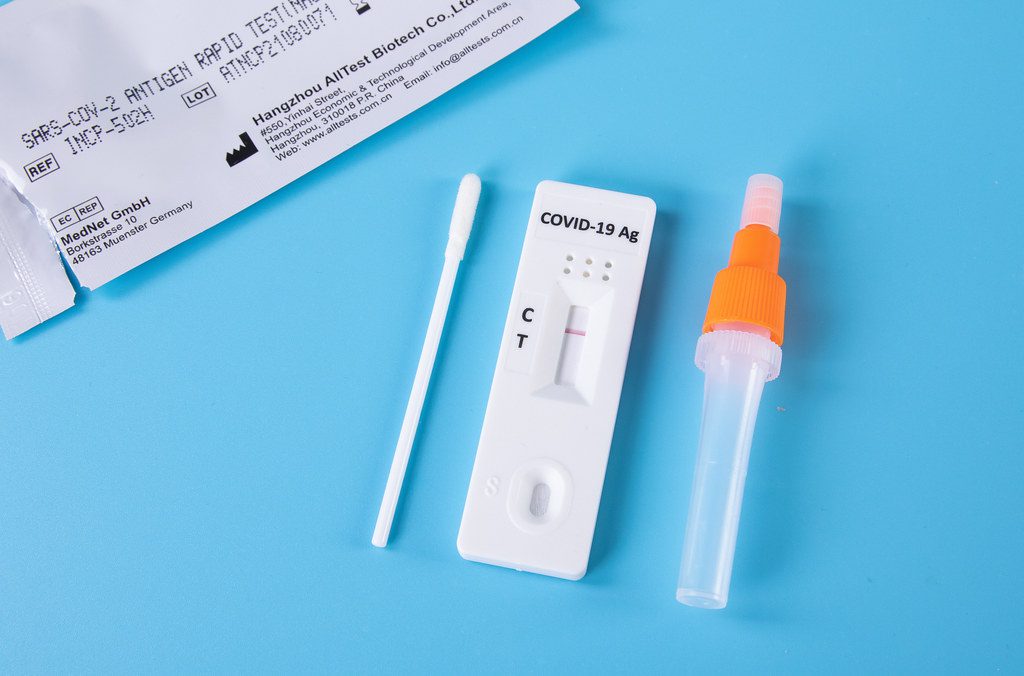Orange County’s COVID-19 hospitalizations continue to soar, surpassing the summer surge and nearing the peak of the first wave in July 2020, according to data released Wednesday by the Orange County Health Care Agency.
The number of COVID-infected hospital patients in Orange County increased from 614 Tuesday to 673 Wednesday, with the number of patients in intensive care rising from 110 to 116.
The last time hospitalizations reached that level was mid-February, during a post-holiday winter surge of infections. Exactly one year ago — on Jan. 5, 2021 — there were 2,249 COVID-positive patients hospitalized in Orange County, just as vaccines were being rolled out for front-line medical staff and first responders.
The summer 2021 peak of hospitalizations was reached on Aug. 26, with 592 patients.
During the first virus wave in the summer of 2020, hospitalizations peaked July 14 at 722.
Meanwhile, the county reported 4,646 new COVID cases Wednesday, boosting the cumulative to 362,166. The county also logged four more fatalities, increasing the overall death toll to 5,901.
All of the deaths logged Wednesday occurred in December. The death toll for last month is now 52.
The county has officially sequenced 28 cases of the Omicron variant, but that was as of Dec. 19, the latest data available, according to the OCHCA’s data.
Hospitalizations remain a major concern.
“I do expect hospitalizations will exceed the July 2020 wave because we’re basically within one day of that,” Andrew Noymer, an epidemiologist and UC Irvine professor of population health and disease prevention, told City News Service on Tuesday.
“I do not expect we will exceed the January 2021 wave.”
It is possible the county may have peaked and can look forward to a downturn of cases, but it is too early to tell, Orange County CEO Frank Kim said Wednesday.
On Monday, the latest data available, the county had 999 residents test positive, according to the OCHCA. On Sunday, 1,008 tested positive, much fewer than the 2,594 on Dec. 31, 5,702 on Dec. 30 and 6,259 on Dec. 29, the peak day of this most recent surge.
“It looks a little better,” Kim said. “But testing labs and hospitals are delayed three or four days in terms of reporting testing, so looking at the data today we have a blind spot of three or four days, so it’s hard to see a trend. But it looks like we’re hitting a peak, but I don’t want to say that for sure. … We’re coming off a peak at the end of December — that’s what it looks like — but we can’t validate that until we get another five days out or so.”
It is also difficult to determine just how many residents are getting infected because some get their results from at-home kits, Kim said.
“Everyone’s buying an at-home test from CVS or Walmart and Amazon and there is a QR code so technically you should scan the QR code so there’s a record, but I suspect very few people are doing that,” Kim said.
Orange County Board Vice Chairman Doug Chaffee, who’s in line to become to board chairman next week, said, “A big bugaboo and unknown is what happens over the New Year’s — all those celebrations. We haven’t seen any data out of that yet so it’s hard to say. But hopefully people are finally realizing that the people in the hospital and sick are those who did not get vaccinated. Maybe that’s an incentive to go and do it now.”
Chaffee is concerned about how the surge will affect staffing at local hospitals.
“The hospital numbers are high and we have capacity, but do we have the workers to take care of people,” Chaffee said. “There’s a lot of stress on them, too. It all comes back to most cases are people who didn’t get vaccinated and they’re stressing everybody else out. It’s not very fair, but we just got to keep pushing, pleading and hoping that suddenly the light turns on and people get a shot.”
Noymer said Tuesday that residents “need to understand that any adult who has a cold right now, vaccinated or unvaccinated, quite possibly has COVID and staying home from work when you’re sick can go a long way toward keeping people out of the hospital.
“If you think about going to work anyway, the life you save won’t be yours because you’re well enough to go to work, but the life you save is someone else — the grandmother of your co-worker maybe.”
Noymer added, “There’s a narrative going around that it’s the sniffles, and it is for a lot of people, no doubt about it, but the thing is, it’s still COVID. We still have hospitalizations that have outpaced the Delta wave and the deaths haven’t started coming up yet, but they will. Probably fewer on average than Delta, but still …
“We still need to treat the virus with respect. I’m not saying hide in your basement, but treat the virus with respect.”
Noymer encouraged residents to get a booster shot. He noted that most people completed the two-dose regimen of the mRNA vaccines from Pfizer and Moderna as of July, so they are eligible for a booster shot and should get one as soon as possible.
“I absolutely recommend booster shots and they’re on the way for those 12 and up, but those 16 and up can already get a booster shot if they’re eligible,” Noymer said.
Orange County had 22.1% of its intensive care unit patient beds available and 66% of its ventilators as of Wednesday. Of the hospitalized patients, 87% are unvaccinated, and 88% of the ICU patients are not inoculated.
The county’s adjusted daily case rate per 100,000 residents jumped from 42.6 Tuesday to 53.6. The testing positivity rate soared up from 13.2% to 16.2%, and it increased from 12.6% to 16% in the health equity quartile, which measures underserved communities hardest hit by the pandemic.
The seven-day average for tests per 100,000 increased from 467.9 as of Tuesday to 513.9.
Rising patient numbers have meant delays for people going to hospitals. The average time to drop off a patient at a hospital as of Thursday was between 46 and 47 minutes, according to OCHCA. By Tuesday it was up to between 53 and 54 minutes.
Orange County Supervisor Lisa Bartlett said Tuesday that county officials are encouraging hospitals to erect surge tents to help with triaging patients, as was done during last winter’s surge.
“We’re trying to encourage the hospitals to put up their surge tents because that will help process people faster and reduce the number of ambulance wait times,” Bartlett said. “And it increases capacity for the hospitals.”
As of last week, nine of the county’s 25 hospitals had surge tents put up, she said.
The wave of infections is also affecting entertainment and courthouse functions.
Soka Performing Arts Center is postponing its season opening by two weeks. Officials at South Coast Repertory in Costa Mesa were discussing putting live performances on hold Tuesday evening.
At the Orange County Superior Courts, attorneys were being encouraged to do more virtual appearances for most hearings, reserving live appearances for evidentiary hearings and trials.
Starting Thursday, anyone wanting to use the Mission Viejo Library must make an appointment so the staff can socially distance patrons.
November’s death toll stands at 101, 127 for October, 196 for September and 182 for August.
In contrast, the death toll before the more contagious Delta variant fueled a summer surge was 31 in July, 19 for June, 26 for May, 47 for April, 202 for March and 620 for February.
January 2021 remains the deadliest month of the pandemic with a death toll of 1,596, ahead of December 2020, the next deadliest with 985 people lost to the virus.
The case rate per 100,000 residents for the unvaccinated was 83 as of Dec. 25, the most recent statistics available. That’s up from 31.7 on Dec. 18.
For the vaccinated, the case rate was 21.6, up from 6.1 as of Dec. 18.
The number of fully vaccinated residents in Orange County increased from 2,314,232 to 2,328,647, according to data released Thursday. That represents 67% of the county.
Of the population eligible to receive a shot aged 5 and up, the county is 71% vaccinated.







